Love, commitment, and language are the three ingredients of excellent business writing.
Years ago, I was in love. Early on, I promised my lover, “I’ll not only anticipate your requirements, but I’ll surpass them.” I’ll listen. I will do my best to understand what you want. I will maximize my love for you. “Here’s my commitment: I will deliver 24/7.”
Maria said, “Get real!” She took my measurements by raising one eyebrow that was incredibly thin and well-manicured. Her eyebrow said, “Die you annoying little man,”
As she slipped away from me, I redoubled my efforts. “Maria, I have a proven process–attention to detail, collaboration, immersion in the work, romanticization, and creation. You and I. On time and budget. “All the way, baby.”
She married another guy – a DUI lawyer from Vegas.
My uninspired statements, a lot of vapor on the launch pad for love, failed. Mission aborted.
How many of us who love what we do, whether we are healthcare professionals, financial planners, or restaurateurs, use language that sends customers and potential clients into the arms of the other guy?
There are too many of them, I believe. Here’s what I think. The problem remains the same. I’m talking commitment.
What’s the difference between love that lasts versus one that doesn’t? Commitment is usually the answer. What’s the difference between a company that uses language well, strategically, and beautifully and another that doesn’t do so? Commitment.
A great business writer makes a promise to the people involved in the brand’s experience, whether they are employees, clients, investors, vendors, or prospects. Notice I did not use the word that starts with “stake” but ends with “holders.” This commitment is rooted in respect for readers’ time, intelligence, and desire for helpful information.
It is an indication that we are not committed. We don’t understand that words are signs. The words we use are signs of our intent and meaning.
Noise is increasing. When we are in a situation where we need to find ourselves utilizing words like “utilize” instead of “use,” we are just creating noise. We make noise when we use words like “superior cost-efficiency” or “customer-targeting solutions.”
We tell the world we are not bothered about finding a direct, simple, and human way to express our beliefs. We reveal something even more disturbing. David Ogilvy said, “People who write well also think well.” Good thinking is reflected in good writing.
Imagine telling someone this at a wedding reception.
“Yeah! My new job is customer-targeting solutions.”
“Cool,” says your new friend.
You say, “Yes, our solutions have superior cost efficiency built in.”
Your now-ex-friend says, “Wow! That is amazing!” as she runs away to find an extra-large drink.
Nate Silver is a New York Times blogger, author, and expert in predicting elections. In his book The Noise and the Signal, he writes, “the truth is the signal.” Noise is what keeps us from seeing the truth.
It is the same with business writing. Superior cost efficiency is the noise that distracts us from the truth. Use is the noise that distracts from the fact. Customer Targeting Solutions is noise that distracts from the point. You and I can both find a hundred more examples.
What should I do? Here’s a Takeaway Medley for You
Take a moment to reflect. Rethink your mission and commitment to your audience. All of your brand’s elements begin with the words. Start with your value proposition. Make sure your language has meaning. Take a chance. Please tell us what matters to you most.
Have a look at the websites around you. What percentage of them have Our Services and About Us in their navigation menu? Bla, bla, bla. Is it wrong to do what we do and meet our people? There is always opportunity…
Do not let your language be snarky and glib. Humor in business writing requires a high level of skill. Very little can go a very long way. I recommend a humane, simple, and thoughtful approach to sharing your story. Conversational and friendly. Not casual.
Don’t be afraid to break a few rules. Americans can’t let go of grammar. The Elements of Style. Many people use conversational language that is not grammatically accurate. So?
Love language. An authentic, engaging, and alive language is a wonder of the world. The journey to success is not always easy, but it’s a delight. Feel the wind blowing through your hair as you roll down the windows. Enjoy life.

